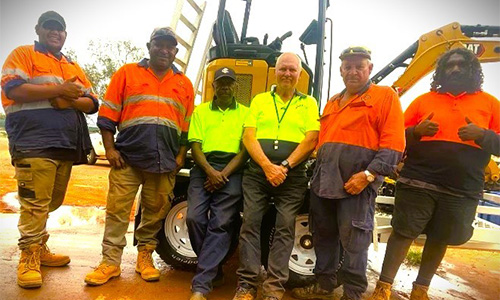Building skills in the regions
A collaboration between a not-for-profit training organisation and a Territory Government department is reaping enormous benefits.
Civil Train NT, the training division of the Civil Construction Federation, and the Department of Industry, Tourism and Trade are conducting training courses in some of the most remote Indigenous communities in Australia.
Mark Hopkins, Civil Train’s regional and remote operations manager, said training in the Outback had many challenges.
“Partnerships and alliances are critical and have enabled Civil Train NT to become one of the most successful, efficient, and productive civil construction remote training and assessment services in the NT,” he said.
Five employees of the Central Desert Regional Council are among the latest graduates.
The four men and one woman took part in a two-week course covering work health safety, plant operations and plant maintenance at Atitjere.
Twenty other trainees, mainly from Ti Tree, Lajamanu, Yuendumu and Atitjere, have recently taken part in similar programs.
All graduated.
The Central Desert Regional Council engaged Civil Train NT to deliver the courses.
The aim of remote workplace training is to enhance the skills and safety standards for First Nations people.
The courses, which have a focus on road projects, waste management and community beautification, are funded by the Northern Territory Government’s Aboriginal Responsive Skilling Grants program, which provides access to training that leads to jobs.
The aim of the training is to boost regional economic development, create new local jobs and boost the capabilities of the workforce.
For more information visit Adult education and training.

